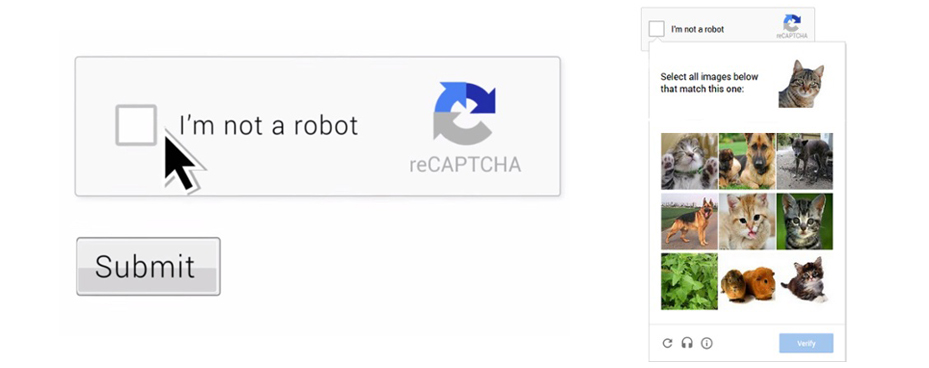 One of the online security checks that internet users are familiar with is CAPTCHA. Google is set to get rid of this annoying CAPTCHA and replace it with an easier one. For desktop users, the random hard-to-read words are being replaced with a simple box to tick next to the words "I am not a robot".
One of the online security checks that internet users are familiar with is CAPTCHA. Google is set to get rid of this annoying CAPTCHA and replace it with an easier one. For desktop users, the random hard-to-read words are being replaced with a simple box to tick next to the words "I am not a robot".
On mobile, Google is also rolling out a more mobile-friendly CAPTCHA where users will be presented with an image, say a kitten, and asked which of nine others is its closest match.
CAPTCHA, an acronym for "Completely Automated Public Turing test to tell Computers and Humans Apart, is widely used by websites to know whether the user is a human or not. It's response test usually uses distorted image, or sometimes with added obscured letters or digits that user must rewrite in a text box.
"For years, we've prompted users to confirm they aren't robots by asking them to read distorted text and type it into a box," said Vinay Shet, Google's Product Manager for reCAPTCHA. "But, we figured it would be easier to just directly ask our users whether or not they are robots - so, we did!"

CAPTCHAs has long frustrate visitors to hundreds of thousands of websites. The fuzzily written or confusingly presented word(s) is not everyone's thing. But as spamming in the current digital world is more than plenty, websites has had no option beside using the system to prevent any abuse.
Computers aren't supposed to be able to read them, while humans "easily" can.
But now the case is rather different. A research at Google has found out that with the advances of artificial intelligence, it's now possible for a computer to solve even the most complex CAPTCHA with impressive accuracy, and in fact better than humans.
Google itself also has made used of this CAPTCHA solving system to extract data from images gathered for Google Street View. The algorithm developed was so good at extracting numbers and letters from images, to their surprise, with 99.8 percent accuracy.
The War Between Spammers and Computer Scientists
Computers use robots to access website and scrap information. Some are programmed to compete with human users for purchases, events and sessions. Many services use these kind of robots to run searches across the web to seek tickets, for example. These robots buy all the tickets as soon as they're available, forcing others to buy them through resellers at an increased price.
They succeed more than often, but sooner or later, they have to face CAPTCHAs.
Programmers weren't giving up. They create better and smarter robots that can solve those "robot barriers". And the war between spammers and computer scientist has begun.
The researchers had a thought, it computers were getting so good at solving these things, perhaps they're also getting good at other things as well.
It began in early 2013 when Google began working on a advanced risk analysis engine that could figure out just who, or what, was behind an attempt to get through a CAPTCHA system. With clues and cues, the researchers gathers information from previous websites that the visitor has been, where their mouse has been on the screen and how long it moved, and others.
The outcome is a program called the no CAPTCHA reCAPTCHA that can "guess" whether the visitor us a human or a computer in just mere seconds.
"In just a few seconds the program could make a good guess about whether 'a human or a 'bot' was making the attempt," said Shet.
The new system doesn't work for all attempts, but for "a significant fraction of users" it means they'll just have to click the "I'm not a robot" and they're good to go.
Google, which acquired reCAPTCHA in 2009, has now deployed the new technology on several websites, including Snapchat, WordPress and Humble Bundle.
The technology is free and Google is making it available to anyone who would like to use it.